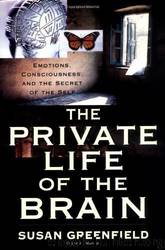The Private Life of the Brain by Susan Greenfield

Author:Susan Greenfield
Language: eng
Format: mobi, epub
Publisher: Penguin Books Ltd
Published: 2002-09-15T07:00:00+00:00
7
THE HUMAN CONDITION
It takes only the softest whisper telling you that you have cancer, that you have failed an exam, or that you have been cheated on by your spouse to throw your whole body into a turmoil of feeling. How can mere words stir up so much emotion? There is no ski slope slithering rapidly beneath your feet, no psychotic drenching of neurons with dopamine, no pharmacological chicanery scoring direct hits on the brain, nor even the excuse of childhood. No current theory of emotions can yet account for this everyday occurrence1—that, in a human adult, mere mental activity, thoughts, can trigger a state primarily characterized by strong feeling.
After all, it is hard to see how grief at a partner’s death might be described in MacLean’s terms, as an emotion slipping free from the grips of the rational, or in Freud’s scheme, as the reduction in some caveman drive. Similarly, LeDoux’s model cannot explain the gut-gripping fear that occurs before a driving test, before surgery, or in a quiet house at night, when no snakes—indeed, no triggers at all—are lionizing the senses.
Let’s look again at the alternative that I have been proposing: Emotions sweep away all sense of the Self. The emotional behavior of children, the ecstasy of ravers, the mercurial, extreme terror and rage of schizophrenics could all be described as instances when the Self is forgotten in favor of a—literally—sensational experience. The more we feel, the less we are, literally, ourselves—the less we are encumbered by previous, idiosyncratic associations that personalize the brain into a mind. These dynamic connections between neurons enable reason and thought, those cognitive phenomena that have already been successfully modeled in artificial systems, and which normally develop with age along with the growth of neuronal connections. The basic feature of such a process is that associations are established between components that can be modified, where the net performance can be changed according to prior outcomes.
The big problem to solve, then, is how raw feeling might arise, not from direct manipulation of brain chemistry by incoming signals from the sense organs, by drugs, or by disease, but merely through the very workings of the brain itself, a large constellation of these ordered, buzzing networks. If my idea is correct, I must now somehow come up with a way to explain how a large, working constellation of neurons—a thought—might trigger a series of very small neuron networks—an emotion.
The most familiar example of an adult brain left entirely to its own devices is the logic-free, literal, and sensual experience of a dream. After all, in a dream, we are normally dominated by vivid, unique processes and events. We do not generalize, think, or reason, but merely observe and react. As with drugs, childhood, and schizophrenia, I am now suggesting that dreams, too, can be interpreted as a failure to generate and access the large neuronal assemblies that give rise to the adult human mind.
Take drugs, for example. We saw in Chapter 4 that with drugs such
Download
The Private Life of the Brain by Susan Greenfield.epub
This site does not store any files on its server. We only index and link to content provided by other sites. Please contact the content providers to delete copyright contents if any and email us, we'll remove relevant links or contents immediately.
Rewire Your Anxious Brain by Catherine M. Pittman(18640)
Talking to Strangers by Malcolm Gladwell(13344)
The Art of Thinking Clearly by Rolf Dobelli(10446)
Mindhunter: Inside the FBI's Elite Serial Crime Unit by John E. Douglas & Mark Olshaker(9313)
Becoming Supernatural by Dr. Joe Dispenza(8196)
Change Your Questions, Change Your Life by Marilee Adams(7754)
Nudge - Improving Decisions about Health, Wealth, and Happiness by Thaler Sunstein(7689)
The Road Less Traveled by M. Scott Peck(7592)
The Lost Art of Listening by Michael P. Nichols(7487)
Mastermind: How to Think Like Sherlock Holmes by Maria Konnikova(7315)
Enlightenment Now: The Case for Reason, Science, Humanism, and Progress by Steven Pinker(7305)
Win Bigly by Scott Adams(7183)
The Way of Zen by Alan W. Watts(6595)
Daring Greatly by Brene Brown(6501)
Big Magic: Creative Living Beyond Fear by Elizabeth Gilbert(5753)
Grit by Angela Duckworth(5601)
Ego Is the Enemy by Ryan Holiday(5412)
Men In Love by Nancy Friday(5232)
The Laws of Human Nature by Robert Greene(5170)
